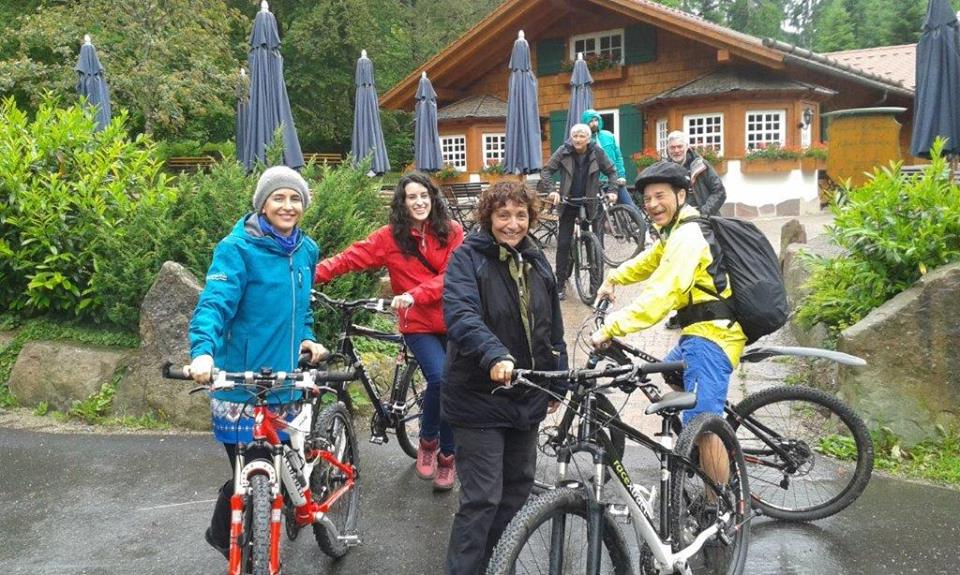With 52 million visits per year, Germany is ranked second on the list of the world’s favourite destinations, fifth year in a row. Those who visit it once are virtually guaranteed to come back. Let us explain why.

Tijana Đuričić, PR Manager of the Regional Office of the German Tourism Association has been working in the Belgrade-based regional office of the German Tourism Association for the past five years. She is a truly versatile person, remembered by people who have come into contact with her for her exceptional kindness and stunning eloquence. In addition to her work at the regional office, she also serves as a university professor, teaching at two faculties, and takes part in opera performances across the world.
“I have always been very curious. Throughout my schooling, the curiosity that has caused me to pursue different interests gradually led to different professions, so my versatility is really a kind of a habit, which came from training. I believe it all comes down to priorities, which tend to change over time. All my strength, stability and joy come from love. In addition to sport, my family is the source of my power; the magical fountain all my energy comes from”, Tijana explains, as she tries to recall the circumstances that made her so successful and so genuinely fascinated by the hidden charms of one of the most powerful countries in the world.
EXCITING BLEND OF PAST AND PRESENT
Spring-time travel lovers who have just recovered from their winter hibernation are busy making plans to visit new destinations. Could you give them three reasons why they should visit Germany?
– Germany is incredibly diverse, stunningly romantic and infinitely simple to get around and explore.
What is, in your view, the biggest advantage this country has in the field of tourism?
– As I said, Germany is a diverse country with a lot going on in the area of culture, with stunning tradition and breathtaking nature. It is fair to say that it has an almost perfect infrastructure. Even the most remote areas are well-connected and can be easily reached by train, bus and car, which is why everyone can experience this diversity without much effort and both enjoy picturesque landscapes and admire pristinely maintained and incredibly organized towns and cities. In Germany, the past is incredibly intertwined with the present, creating an exciting image everyone can appreciate and enjoy. The heritage of the past centuries is respected and old traditions maintained, while at the same time innovative new ways of thinking and artistic expression are encouraged as a natural course of evolution.

What impression do visitors get as they traverse this vast country?
– One is guaranteed to experience different views and different sustainability concepts. I refer here to common values and the love for tradition, both of which are deeply ingrained into the very fabric of the identity of the German people. Extensive renovation works that are frequently undertaken here aim to keep the centuries-old legacy alive. The feeling of caring about the people and the environment is deeply rooted in German society. German towns and metropolises keep improving their sustainability concepts. As a result, different international bodies regularly present prestigious awards to German urban centres, in recognition of their achievement in the area of traffic, quality of air and water, urban planning and landscaping, and energy efficiency of their structures. Traveling across Germany, travelers can experience first-hand the vibrant green cities, which lead by example and showcase the future of urban centres. One can also see the towns which returned to their roots and reintroduced city gardens or beekeeping projects.
Could you tell us more about the most fascinating attractions for families and suggest some of the best clubs?
– The best clubs for the young audiences are, without any doubt, located in the German capital. Each day, Berlin is the center of around 150 events catering to an impressive range of very different tastes and preferences. The city’s legendary clubs give this metropolis a very special charm. Its world-famous electronic music scene has been known for decades, and its top-tier talent, combined with lax regulations allowing parties to run for multiple days non-stop, have made Berlin the “world techno capital”. The most captivating attraction for families is the Europa Park, which offers an inspirational experience both for the children and their parents. The park’s fascinating exhibits, which form its interior and exterior, portray different countries and their cultural heritage. The guests can also enjoy delicious food and an adrenaline-rush brought about by the park’s most recent addition, conveniently named the Flying Theater.
Which culinary delicacies would you recommend?
– It all depends on the region and the season. In Bavaria, for example, a must-try experience would inevitably include a variety of sausages and beer. The Alps region, on the other hand, is the home of the traditional soft egg noodles with cheese – the world famous Käsespätzle, the Swartzwald region earned fame for its delicious Swartzwald cake (Blackforest cake), the Rhine and Moselle basin is known for its Riesling, while the northern part of the country is famous for its delicious fish sandwich and its fragrant eggnog.
How many visitors per year come from BiH and what is, in your view, the most appealing feature of Germany for these visitors?
– According to the statistics, 236,000 residents of BiH visit Germany every year. The largest group of visitors coming from BiH are the people aged between 15 and 34, who stay over four nights. This group accounts for as much as 94% of the total. The castles of Bavaria, Munich and Berlin attract the majority of tourists from this region. It is interesting that most people who come to Germany once, often come back again. There are countless other places, some of which are secluded and some simply not as popular as the most famous sites, that also capture the attention of travelers from this region.

Is it expensive to be a tourist in this country? How much money does it take on average to visit Germany?
– Perhaps the biggest advantage that Germany has as a destination for tourists is the great value it offers for the money. The travelers may plan their travel to suit their unique needs and budgets, and our website www.germany.travel features a fascinating online tool that can help a lot in the planning process. As an orientation, most tourists from BiH spend 36 € per day on average while in Germany, which may be a useful thing for prospective travelers to consider as they plan their visit to this fascinating country.
You very much enjoyed the opportunity to explore different parts of Germany and experience its fabulous cities and pristine nature. Do you have a favorite place in Germany?
– I love Berlin and Hamburg for their atmosphere and their art events and venues, I love Koblenz; I cannot resist its poetic appeal, I also love Augsburg and its Christmas Fair. I also enjoy Schwarzwald and the shallow Wadden Sea, which remind me of nature’s enormous healing potential. I should also mention that, in my experience, good company makes an important ingredient of the fondest travel memories and Germans are known as kind and warm-hearted hosts.
What are the biggest challenges in your line of work, that make it all worthwhile?
– Believe it or not, implementing long-term ideas of a stable, economically developed system which aspires to constant progress, in six very different countries can be very challenging. Our activities run at a very different pace in each of these countries. Overcoming that challenge is my favorite part, as it drives me to get to know better and befriend colleagues from other countries.
The Charm of German Cities
“If you decide to visit Germany, make sure you visit Berlin, Hamburg, Dresden and Koblenz. Their cosmopolitan spirit and their charm, combined with a variety of fascinating cultural events will make your visit count. If you have enough time, cities such as Heidelberg, Rostock and Augsburg, should definitely make your itinerary.
The Homeland of the Pioneers of Alternative Medicine
“In Germany, health has always been regarded very highly. Combination of traditional treatments and modern medicine is what makes German spas and healing resorts the centers of excellence. There are over 1,000 hotels specialised in wellness and beauty treatments and 350 officially recognised spas and healing resorts. The resources are widely available across the country. Mineral and thermal springs, healing mud, the mild climate, expertise in alternative methods of healing first introduced by Kneipp, Felke and Schroth, sea water and speleotherapy, are just a few of the many therapeutic options and treatments available. In addition, around 2,000 hospitals across Germany are very well organized. Patients get comprehensive treatment tailored to their specific needs, which integrates the most recent developments and practices available. Many hospitals introduced additional services for non-resident patients. I would suggest to all those eager to find out more, to check out the list of hospitals available on our website www.germany.travel within the section titled: Medical Travel.”
Interviewed by: Elma Zećo




